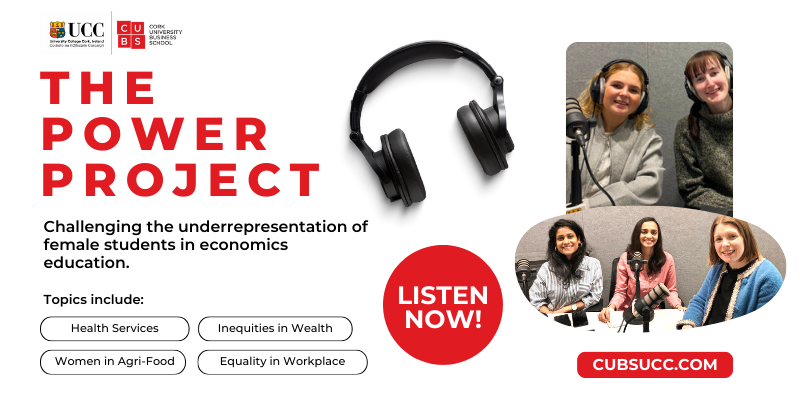
Increasing numbers of female students are studying economics (up to 36%) and 41% of academic economists are females. Yet despite this upward trend under presentation of the female voice discussing economics in mainstream media persists. Only fifth of experts on Irish national radio shows are women.
Female economics students at the Cork University Business School (CUBS) in University College Cork, guided by Dr Aileen Murphy and Dr Lee-Ann Burke, are challenging this underrepresentation through the POWER project.
POWER encourages and promotes the voice of female economists in the media. According to project founder, Dr Aileen Murphy (Senior Lecturer in Department of Economics, UCC) the project offers female university students a unique and innovative opportunity to connect with peers and female economists engaging in economic research and to develop the skills to confidently discuss their research in public.
In collaboration with UCC Campus Radio, this year 13 students participated and produced five podcasts. Themes explored in the shows centred around the United Nation’s Sustainable Development Goals and the work of previous female Noble Prize winners. Themes explored in the podcast include obesity and the health service, inequities in wealth, role of women in agri-food industry, how we can use resources more ecologically and gender inequality in the workplace.
Students first researched their topic of interest and then interview female economists in collaboration with the Irish Society for Women in Economics. This encouraged students to engage with curriculum material in a creative way and expanded their network across CUBS and and interact with female economists in their individual fields of interest. While working with UCC Campus Radio to create podcasts enhanced students’ organisation, collaborative and communication skills.
Claragh O’ Sullivan, a BComm Internation (German) student on the programme, found it to be “an invaluable experience. I enhanced my teamwork and technology skills and deepened my knowledge of economics. Working alongside other women was both motivating and inspiring, and I am privileged to have been a part of it.”
According to project co-ordinator, Dr Lee-Ann Burke (Lecturer in Department of Economics, UCC) the students were provided with in-depth learning experiences, producing a tangible outcome that students can utilise in the competitive job market.

The project closely aligns with the Irish Society of Women in Economics’ vision, to ensure that the role of economists in public debates and policy decisions, as well as the educational and private sector organisations, are more representative of Irish society in terms of gender balance, and support minority representation. Specifically, it provided a platform to discuss gender inequality, as students commented “... not only did we realise the importance of gender equality in the economic field, but we also used interviews to delve into economic knowledge and combine theory with reality.”
While female representation in the field of economics has steadily increased, the importance of ensuring the female voice is heard is pertinent. Equipping female students with the skills and the confidence to partake in media discussions offered by this project indicates a step in the right direction in reducing gender barriers in the field. This is strongly aligned with the HEA’s Gender Taskforce Action Plan, as well as the 2021 Citizens’ Assembly on Gender Equality which recommended that gender equality becomes the norm in Irish society.
Launch of these podcasts coincides with the recent announcement that Cork University Business School (CUBS) achieved its first Athena SWAN Bronze Award for gender equality in higher education. The award celebrates good practice towards the advancement of gender equality and representation. The Athena SWAN Bronze Award recognises the School’s commitment to gender equality in higher education, the spirt of which is encapsulated in this POWER project according to Dr Frank Crowley, Vice Dean for Equality Diversity and Inclusion, at CUBS.

